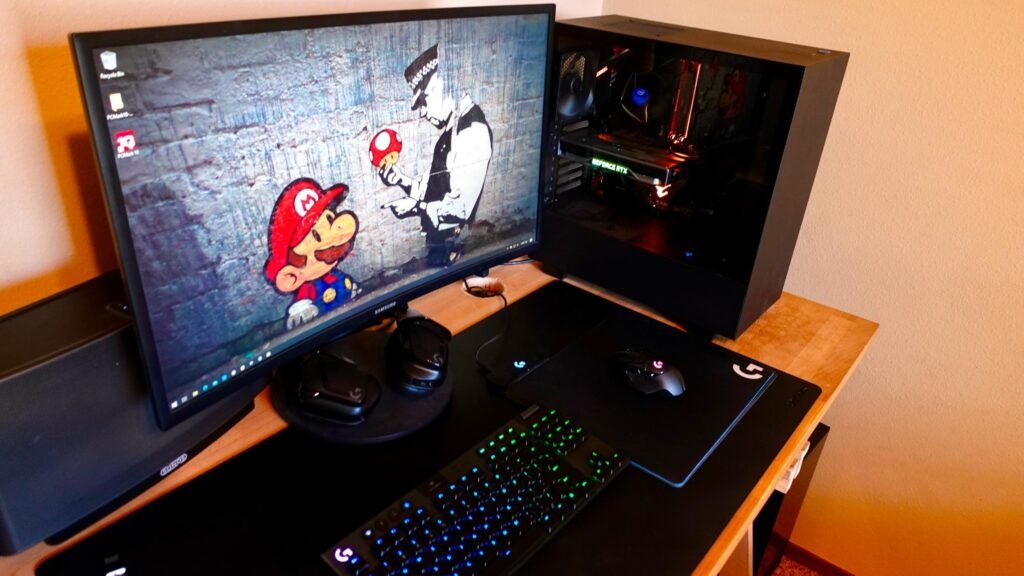Unsure about which components to purchase for your gaming setup? Here are significant parts for your gaming PC every gamer must take into account.

Your gaming experience can be improved by a cooling system, high refresh rate monitor, NVMe SSD, and at least 16GB of RAM.
It is important to consider the compatibility and requirements of your motherboard, case, and power supply when selecting parts.
Identifying key gaming components and understanding their impact on performance is crucial when selecting parts for your gaming PC. With this knowledge, you can confidently choose the right components without feeling overwhelmed.
RAM
Fast memory is necessary for both the GPU and CPU to store temporary data during gaming. The GPU has built-in Video Random Access Memory (VRAM), while a separate Random Access Memory (RAM) component is required for CPUs; this must be obtained and installed on your motherboard separately.
If you’re purchasing RAM, make sure to examine these specifications:
RAM’s capacity is measured in Gigabytes (GB), indicating the maximum amount of memory it can hold.
RAM speed can be quantified in either mega-transfers per second (MT/s) or megahertz (MHz), depending on the producer. Mega-transfer gauges how much data RAM transfers every second, whereas megahertz determines its frequency or clock rate.
There are five generations of DDR (Dual Data Rate) RAM. Currently, the most frequently used generation is DDR4 while DDR3 has become obsolete and newer PCs have started adopting DDR5. The number and layout of pins in each RAM generation differ from one another.
It’s essential to verify which particular You must ensure that your motherboard supports the appropriate version when selecting a new type of DIMM memory for upgrading or building a computer system. RAM format meets your motherboard’s requirements before purchasing it for enhancement or assembling PC systems purposes.
To guarantee seamless gameplay and multitasking capabilities, it is recommended to choose 16GB of RAM at minimum. Enhanced performance can be achieved with higher capacities, particularly in games or applications that require significant memory usage.
Don’t worry about it currently since it doesn’t impact the performance significantly. If you maintain a minimum speed of 3000 MHz /MT/s for DDR4 and 5000 Mhz/MTs for DDR5, your gaming PC should function smoothly.
COOLING SYSTEM
An increased likelihood of overheating can result from the installation of high-performance components on your gaming rig. To guarantee uninterrupted hours of gameplay, it is crucial to locate an efficient cooling system.
Most gaming setups can rely on air cooling solutions, including case fans and aftermarket CPU coolers. However, for enthusiasts who are pushing the limits with overclocking or high-performance components, liquid cooling provides superior heat dissipation capabilities while also operating more quietly.
For optimum CPU cooling, we suggest opting for an All-In-One (AIO) liquid cooler as it is not only relatively easy to install and maintain but also provides better performance.
While selecting the perfect AIO for your system, take into account aspects like radiator size, pump noise level and coolant type in order to make a well-informed decision about your liquid-cooling setup.
To ensure optimal functioning of your PC, it’s essential to utilize all available fan slots. Opting for larger case fans results in a quieter gaming experience; whereas installation of smaller ones can accommodate two to five additional fans yet lead to increased noise and maintenance concerns due to associated messiness.
For those who have the budget, high-end options like MagLev PC Fans and iCUE LINK are always an option worth considering.
A monitor with a high refresh rate.
To enhance your gaming experience with smoother motion and less input lag, opt for a high refresh rate monitor that can display more frames per second. Look for monitors with at least 144Hz refresh rates or higher options like 240Hz or even 360 Hz if you want the ultimate fluidity in gameplay.
Furthermore, seek out functionalities like adaptive sync technologies (NVIDIA G-SYNC or AMD FreeSync) that can eliminate screen tearing and stuttering to ensure a seamless gaming experience without any tears.
A Solid State Drive
Due to their swift read and write speeds, Solid-State Drives (SSDs) have become indispensable storage solutions for gamers. A reliable SSD doesn’t only significantly decrease game loading times but also enhances the system’s overall response time.
When it comes to gaming, the only factors you need to worry about in an SSD are its memory capacity and type. Even though there are numerous types, versions and form factors available for SSDs.
Two categories of SSDs exist, namely SATA and NVMe. The former stands for “Serial Advanced Technology Attachment” and denotes a standardized interface applied to join storage devices such as solid-state drives (SSDs) or hard disk drives (HDDs) with the motherboard of a computer. In contrast, non-volatile memory express – abbreviated as NVMe – delivers superior performance through employing PCIE slots that enable more rapid data transmission interchangeably at lower latency rates compared to SATA technology.
If you don’t possess a SATA SSD, then we suggest avoiding them due to their insignificant price gap in relation to NVMe SSDs.
CPU and GPU
The foundation of every gaming PC is comprised of two essential components, the CPU (Central Processing Unit) and GPU (Graphics Processing Unit), working in unison to expertly manage intricate calculations and rendering tasks necessary for a superior gaming experience.
If you have limited funds, making a wise choice between prioritizing a superior CPU or GPU can depend on the kind of games you mainly intend to play.
Games heavily dependent on physics calculations, artificial intelligence (NPCs), and complex simulations often require a powerful CPU to deliver optimal performance. Some examples of such games include:
In titles such as StarCraft II or Age of Empires, real-time strategy (RTS) games place significant importance on CPU power to effectively manage numerous units, perform AI calculations and handle game logic.Conversely, games that require superior GPU capabilities heavily depend on rendering and visual effects, including:
The main focus of GPU power in FPS games such as Call of Duty, Battlefield and Cyberpunk 2077 lies in rendering intricate environments, character models and extraordinary effects.
To render the intricate lighting effects and sprawling, visually impressive landscapes in games like Assassin’s Creed or Red Dead Redemption, a resilient GPU performance is requisite.
High GPU performance is required to maintain smooth frame rates and render immersive 3D environments for an optimal VR experience in games such as Half-Life: Alyx or Beat Saber.
All contemporary games demand a comprehensive PC setup for seamless gameplay. Therefore, it remains essential to maintain equilibrium between the components to avoid any hindrances while gaming.
It is acceptable to prioritize one component over the other, provided that both the CPU and GPU are functioning at a comparable level throughout gameplay.
Additional Computer Component to Contemplate
In addition to the fundamental parts stated earlier, a number of other components are essential in constructing a gaming computer:
When selecting a motherboard, ensure that it is compatible with your selected CPU, GPU and RAM. Look for features such as support for overclocking, abundant connectivity options and the potential for future upgrades.
When it comes to power supply, ensure that you invest in a dependable PSU unit with enough wattage capacity to safely fuel all your system components. Keep future upgrades or additions also in mind while making this decision. It is vital to check if the selected power supply can meet the demands of every component on your gaming rig.
Choose a case that not only fits all your selected components but also provides adequate ventilation, cable organization, and visual appeal in line with your preferences. A larger casing will allow for more prominent parts and additional fans to enhance cooling efficiency.
Conclusion
To sum up, if you are constructing a gaming PC, make sure to prioritize the CPU and GPU which provide substantial processing power. You should also aim for sufficient RAM and speedy storage facility that will ensure seamless performance.
It is essential to invest in an efficient cooling system to maintain optimal temperatures while pairing it with a high refresh rate screen brings out the most immersive gameplay experience possible.
To secure long-term usage of your rig, consider component compatibility as well as quality parts investment while making all these decisions about building your machine from scratch!

